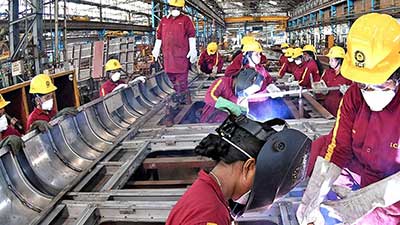Date: 12/01/2023
Relevance: GS-3: Indian Economy and issues relating to planning, mobilization, of resources, growth, development and employment; Infrastructure development.
Key Phrases: Special Economic Zones(SEZ), SEZ Act 2005, Development Of Enterprises And Services Hub (Desh) Bill, 2022, National Manufacturing Policy
Why in News?
- Niti Aayog has raised objections to certain provisions pertaining to the proposed DESH (Development of Enterprise and Service Hubs) bill, which seeks to replace the existing law for special economic zones.
Objectives of Development of Enterprise and Service Hubs bill:
- It aims to provide for the establishment, development and management
of Development Hubs, including-
- existing Special Economic Zones
- enclaves for the purposes of the promotion of economic activity, employment generation, integration with global supply and value chains
- maintenance of manufacturing and export competitiveness,
- development of infrastructure facilities,
- promotion of investments, and investment in research and development.
Draft Development of Enterprise and Service Hubs (DESH) Bill, 2022:
- By this bill, SEZs will be freed from many of the rules that burden
SEZs:
- They will no longer be required to be net foreign exchange positive.
- They will be allowed to sell in the domestic market much more easily.
- SEZs, the units operating within the new hubs will no longer benefit from direct tax incentives, which will be scrapped — a move that will make the hubs compliant with World Trade Organization rules.
- SEZs, the development hubs will be allowed to sell outside the demarcated area or in the domestic market with duties only to be paid on the imported inputs and raw materials instead of the final product.
- The Bill proposes an equalization levy for clearance in the domestic market.
- The Bill does not limit how long units can store goods, which is one year currently. Besides, there is no mandatory payment requirement in foreign exchange.
- The Bill marks a “fundamental shift" from linking SEZs with exports to possibly leveraging the hubs for domestic consumption and increased employment generation.
Why is the Desh Bill an Enigma?
- Reduced focus and effectiveness:
- DESH includes every activity such as industrial, manufacturing, technology, services, logistics, financial services centers (GIFT city). Such a wide coverage reduces focus and effectiveness of the proposed law.
- Ambiguity related to the primary stakeholder:
- Under the Constitution (List 1 to the Seventh Schedule), trade and commerce with foreign countries, namely exports, is the domain of the Central Government and the SEZ Act made sense.
- By redirecting focus from export to establishment, development and management of “Development Hubs”, the proposed legislation extends beyond export and permeates “Industry”, something within the purview of States.
- Detrimental impact of coordinated effort on the balanced economic
growth:
- Consensus between the Centre and States is critical for the success of industrial development.
- However, the coordinated effort of the central and state government has unfortunately worked at cross purposes, often to the detriment of balanced industrial growth.
- Contradiction with emphatic objectives:
- Multiple industrial initiatives (cluster development, industrial parks etc) have been floated over the years.
- For example, the “National Investments and Manufacturing Zones (NIMZ) scheme under the National Manufacturing Policy (NMP) was announced in 2011.
- The Ministry of Commerce and Industry clarified that the main objective of SEZs is promotion of exports, while NIMZs are based on the principle of industrial growth in partnership with States and focus on manufacturing growth and employment generation.
- Thus, the promulgation of DESH is an apparent contradiction with such explicit disclosure of the objectives.
- No significant attempt to converge policies and schemes:
- By 2012, the SEZ regime was lopsided, focussing more on export of IT/ITES services rather than the manufacturing sector.
- Moreover, the states implementing two or more industrial policies in the period 2008-2014 witnessed lower employment and Gross Value-Added levels relative to States with no industrial policy in place.
- Thus, rather than converging existing policies towards a common economic direction, DESH may not be able to correct this directional inconsistency.
- Even at the federal level, schemes like the EOU and Software Technology Parks of India schemes run parallel and often create conflict.
- Coexistence of IDR Act and DESH:
- The Industrial (Development & Regulation) Act, 1951 is a central Act that covers a wide list of core manufacturing industries and how the IDR Act and DESH will co-exist is unclear.
Source: The Hindu
Mains Question:
Q. The proposed DESH (Development of Enterprise and Service Hubs) bill seeks to replace the existing law for special economic zones. Critically Analyse. (250 words).






















